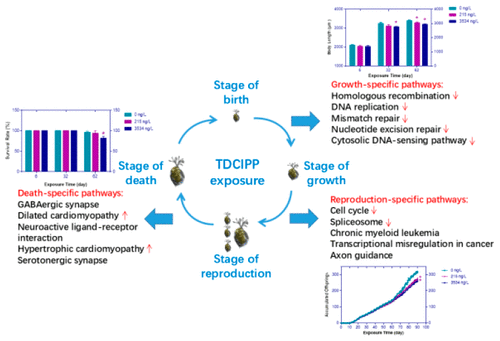当前位置:
X-MOL 学术
›
Environ. Sci. Technol.
›
论文详情
Our official English website, www.x-mol.net, welcomes your
feedback! (Note: you will need to create a separate account there.)
Whole-Life-Stage Characterization in the Basic Biology of Daphnia magna and Effects of TDCIPP on Growth, Reproduction, Survival, and Transcription of Genes
Environmental Science & Technology ( IF 10.8 ) Pub Date : 2017-11-17 00:00:00 , DOI: 10.1021/acs.est.7b04569 Han Li 1 , Siliang Yuan 1, 2 , Guanyong Su 3 , Meng Li 4 , Qiangwei Wang 4 , Guonian Zhu 4 , Robert J. Letcher 5 , Yufei Li 6 , Zhihua Han 7 , Chunsheng Liu 1, 8
Environmental Science & Technology ( IF 10.8 ) Pub Date : 2017-11-17 00:00:00 , DOI: 10.1021/acs.est.7b04569 Han Li 1 , Siliang Yuan 1, 2 , Guanyong Su 3 , Meng Li 4 , Qiangwei Wang 4 , Guonian Zhu 4 , Robert J. Letcher 5 , Yufei Li 6 , Zhihua Han 7 , Chunsheng Liu 1, 8
Affiliation

|
Toxicity tests of chemicals have mainly focused on the partial life-cycle evaluation of model animals. Limited information is available for the evaluation of effects of chemicals from a whole-life-stage exposure perspective. The objective of this study was to perform a whole-life-stage characterization in the basic biology of Daphnia magna (D. magna) and evaluate the effects of a known organophosphate ester (OPE) contaminant, tris(1,3-dichloro-2-propyl) phosphate (TDCIPP), on growth, reproduction, survival, and transcription of genes. The whole-life-stage characterization in growth, reproduction, and survival of D. magna was conducted, and representative sampling time points for the three developmental stages were identified (day 6, day 32, and day 62). Transcriptomic profiles for these three stages were compared, and stage-specific PCR arrays of D. magna were developed. The whole-life-stage exposure to environmentally relevant or greater concentrations of TDCIPP significantly inhibited growth and reproduction of D. magna and decreased survival at the later stage of the exposure experiment (≥32 days). Such adverse effects were not observed in the early stage of the exposure (<32 days), suggesting that short-term toxicity tests, such as the standard 21-day test, might underestimate the environmental risk of TDCIPP. Furthermore, expressions of genes selected at day 6, day 32, and day 62 were significantly changed after TDCIPP exposure, and the changes in the expressions of partial genes were correlated to the inhibitory effects on growth, reproduction, and survival.
中文翻译:

大型蚤(Daphnia magna)基本生物学中的全生命期表征以及TDCIPP对基因的生长,繁殖,存活和转录的影响
化学药品的毒性测试主要集中在模型动物的部分生命周期评估上。从整个生命周期的暴露角度来看,用于评估化学药品效果的信息有限。这项研究的目的是在水蚤(Daphnia magna)(D. magna)的基本生物学中进行整个生命周期的表征,并评估已知的有机磷酸酯(OPE)污染物tris(1,3-dichloro-2)的影响。 -丙基)磷酸(TDCIPP),用于基因的生长,繁殖,存活和转录。马格纳酵母的生长,繁殖和存活的全生命期特征进行了研究,并确定了三个发育阶段(第6天,第32天和第62天)的代表性采样时间点。比较了这三个阶段的转录组谱,并开发了D. magna的阶段特异性PCR阵列。在整个生命周期中,与环境相关或更高浓度的TDCIPP暴露显着抑制了D. magna的生长和繁殖。并在暴露实验的后期(≥32天)降低了生存率。在暴露的早期(<32天)未观察到此类不利影响,这表明短期毒性试验(例如标准的21天试验)可能低估了TDCIPP的环境风险。此外,TDCIPP暴露后,在第6天,第32天和第62天选择的基因表达发生了显着变化,部分基因表达的变化与对生长,繁殖和存活的抑制作用相关。
更新日期:2017-11-19
中文翻译:

大型蚤(Daphnia magna)基本生物学中的全生命期表征以及TDCIPP对基因的生长,繁殖,存活和转录的影响
化学药品的毒性测试主要集中在模型动物的部分生命周期评估上。从整个生命周期的暴露角度来看,用于评估化学药品效果的信息有限。这项研究的目的是在水蚤(Daphnia magna)(D. magna)的基本生物学中进行整个生命周期的表征,并评估已知的有机磷酸酯(OPE)污染物tris(1,3-dichloro-2)的影响。 -丙基)磷酸(TDCIPP),用于基因的生长,繁殖,存活和转录。马格纳酵母的生长,繁殖和存活的全生命期特征进行了研究,并确定了三个发育阶段(第6天,第32天和第62天)的代表性采样时间点。比较了这三个阶段的转录组谱,并开发了D. magna的阶段特异性PCR阵列。在整个生命周期中,与环境相关或更高浓度的TDCIPP暴露显着抑制了D. magna的生长和繁殖。并在暴露实验的后期(≥32天)降低了生存率。在暴露的早期(<32天)未观察到此类不利影响,这表明短期毒性试验(例如标准的21天试验)可能低估了TDCIPP的环境风险。此外,TDCIPP暴露后,在第6天,第32天和第62天选择的基因表达发生了显着变化,部分基因表达的变化与对生长,繁殖和存活的抑制作用相关。











































 京公网安备 11010802027423号
京公网安备 11010802027423号